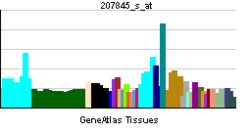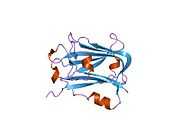ANAPC10
Anaphase-promoting complex subunit 10 is an enzyme that in humans is encoded by the ANAPC10 gene.[1][2][3]
Interactions
ANAPC10 has been shown to interact with CDC27,[4][5] Mothers against decapentaplegic homolog 3[6] and Mothers against decapentaplegic homolog 2.[6]
References
- ↑ Grossberger R, Gieffers C, Zachariae W, Podtelejnikov AV, Schleiffer A, Nasmyth K, Mann M, Peters JM (Jun 1999). "Characterization of the DOC1/APC10 subunit of the yeast and the human anaphase-promoting complex". J Biol Chem 274 (20): 14500–7. doi:10.1074/jbc.274.20.14500. PMID 10318877.
- ↑ Wiemann S, Weil B, Wellenreuther R, Gassenhuber J, Glassl S, Ansorge W, Bocher M, Blocker H, Bauersachs S, Blum H, Lauber J, Dusterhoft A, Beyer A, Kohrer K, Strack N, Mewes HW, Ottenwalder B, Obermaier B, Tampe J, Heubner D, Wambutt R, Korn B, Klein M, Poustka A (Mar 2001). "Toward a catalog of human genes and proteins: sequencing and analysis of 500 novel complete protein coding human cDNAs". Genome Res 11 (3): 422–35. doi:10.1101/gr.GR1547R. PMC 311072. PMID 11230166.
- ↑ "Entrez Gene: ANAPC10 anaphase promoting complex subunit 10".
- ↑ Vodermaier, Hartmut C; Gieffers, Christian; Maurer-Stroh, Sebastian; Eisenhaber, Frank; Peters, Jan-Michael (Sep 2003). "TPR subunits of the anaphase-promoting complex mediate binding to the activator protein CDH1". Curr. Biol. (England) 13 (17): 1459–68. doi:10.1016/S0960-9822(03)00581-5. ISSN 0960-9822. PMID 12956947.
- ↑ Gmachl, M; Gieffers C; Podtelejnikov A V; Mann M; Peters J M (Aug 2000). "The RING-H2 finger protein APC11 and the E2 enzyme UBC4 are sufficient to ubiquitinate substrates of the anaphase-promoting complex". Proc. Natl. Acad. Sci. U.S.A. (UNITED STATES) 97 (16): 8973–8. doi:10.1073/pnas.97.16.8973. ISSN 0027-8424. PMC 16806. PMID 10922056.
- ↑ 6.0 6.1 Nourry, Claire; Maksumova Lola; Pang Mona; Liu Xiaohong; Wang Tongwen (May 2004). "Direct interaction between Smad3, APC10, CDH1 and HEF1 in proteasomal degradation of HEF1". BMC Cell Biol. (England) 5: 20. doi:10.1186/1471-2121-5-20. PMC 420458. PMID 15144564.
Further reading
- Kurasawa Y, Todokoro K (1999). "Identification of human APC10/Doc1 as a subunit of anaphase promoting complex.". Oncogene 18 (37): 5131–7. doi:10.1038/sj.onc.1203133. PMID 10498862.
- Gotthardt M, Trommsdorff M, Nevitt MF et al. (2000). "Interactions of the low density lipoprotein receptor gene family with cytosolic adaptor and scaffold proteins suggest diverse biological functions in cellular communication and signal transduction.". J. Biol. Chem. 275 (33): 25616–24. doi:10.1074/jbc.M000955200. PMID 10827173.
- Gmachl M, Gieffers C, Podtelejnikov AV et al. (2000). "The RING-H2 finger protein APC11 and the E2 enzyme UBC4 are sufficient to ubiquitinate substrates of the anaphase-promoting complex.". Proc. Natl. Acad. Sci. U.S.A. 97 (16): 8973–8. doi:10.1073/pnas.97.16.8973. PMC 16806. PMID 10922056.
- Wendt KS, Vodermaier HC, Jacob U et al. (2001). "Crystal structure of the APC10/DOC1 subunit of the human anaphase-promoting complex.". Nat. Struct. Biol. 8 (9): 784–8. doi:10.1038/nsb0901-784. PMID 11524682.
- Strausberg RL, Feingold EA, Grouse LH et al. (2003). "Generation and initial analysis of more than 15,000 full-length human and mouse cDNA sequences.". Proc. Natl. Acad. Sci. U.S.A. 99 (26): 16899–903. doi:10.1073/pnas.242603899. PMC 139241. PMID 12477932.
- Vodermaier HC, Gieffers C, Maurer-Stroh S et al. (2004). "TPR subunits of the anaphase-promoting complex mediate binding to the activator protein CDH1.". Curr. Biol. 13 (17): 1459–68. doi:10.1016/S0960-9822(03)00581-5. PMID 12956947.
- Nourry C, Maksumova L, Pang M et al. (2005). "Direct interaction between Smad3, APC10, CDH1 and HEF1 in proteasomal degradation of HEF1.". BMC Cell Biol. 5: 20. doi:10.1186/1471-2121-5-20. PMC 420458. PMID 15144564.
- Gerhard DS, Wagner L, Feingold EA et al. (2004). "The status, quality, and expansion of the NIH full-length cDNA project: the Mammalian Gene Collection (MGC).". Genome Res. 14 (10B): 2121–7. doi:10.1101/gr.2596504. PMC 528928. PMID 15489334.
- Rual JF, Venkatesan K, Hao T et al. (2005). "Towards a proteome-scale map of the human protein-protein interaction network.". Nature 437 (7062): 1173–8. doi:10.1038/nature04209. PMID 16189514.
External links
- ANAPC10 human gene location in the UCSC Genome Browser.
- ANAPC10 human gene details in the UCSC Genome Browser.
| |||||||||


